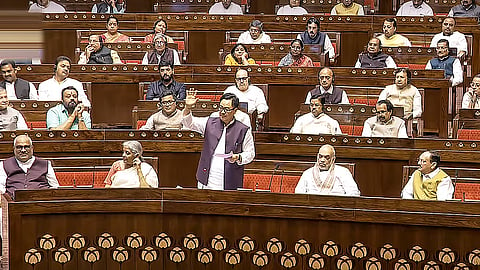

NEW DELHI: The Rajya Sabha on Thursday saw strong protests against the Waqf (Amendment) Bill, 2025, which was introduced by Union Minority Affairs Minister Kiren Rijiju. Members of the INDIA bloc, including Congress, TMC, DMK, AAP, Shiv Sena (UBT), Samajwadi Party, RJD, and Left parties, opposed the Bill. They called it 'unconstitutional' and said it was aimed at taking away the rights of Muslims over Waqf properties.
Leader of the House and BJP leader J P Nadda defended the Bill, saying it was not against Muslims but intended to help the poor and protect Muslim women’s rights. He accused the Congress of treating Muslim women as second-class citizens in the past, while the Modi government had taken steps like banning triple talaq. “We believe in real service, not lip service… I stand in support of the (Waqf) Bill as its sole purpose is to bring reforms in managing the Waqf properties,” Nadda said. He added that the amendment was meant to make Waqf property management more accountable.
Congress MP Syed Naseer Hussain led the opposition, calling the Bill "unconstitutional" and accusing the BJP of trying to create communal tensions for political gains. He said the government ignored opposition suggestions during the joint parliamentary committee (JPC) discussions and was treating Muslims as "second-class" citizens. RJD’s Manoj Jha also raised concerns about the Bill’s intent and demanded that it be sent to a select committee for further review. He warned that it could be seen as "dog whistle politics" and might further isolate Muslims from mainstream society.
Samajwadi Party MP Ram Gopal Yadav stressed the need for equal respect for all religions and warned that India was heading towards a totalitarian state. He pointed out that Muslims in Uttar Pradesh were already facing restrictions on offering namaz, even on their rooftops. CPI(M) MP John Brittas argued that the Bill violated the Indian Constitution’s principles of secularism, democracy, and equality. He accused the government of creating divisions among religious communities.
Congress MP Abhishek Singhvi highlighted two major concerns: the removal of 'Waqf by User,' which prevents properties from becoming Waqf through continuous use over time, and the application of the Limitation Act. He warned that this change could allow the government or private entities to claim Waqf properties after 12 years of uninterrupted possession. Singhvi said the Bill was a deliberate attempt to weaken protections for Waqf properties while increasing government control.
Independent MP Kapil Sibal questioned why the government was only targeting the Muslim community with this Bill. He argued that similar reforms should apply to all religious groups, particularly in inheritance laws affecting women. He urged the government to introduce a law ensuring daughters' rights to inherit property. BJD MP Muzibulla Khan expressed concern that the Bill could allow non-Muslims to manage Waqf properties, making Muslims uneasy.
DMK leader Tiruchi Siva strongly opposed the Bill, calling it legally flawed and morally wrong. He said it unfairly targeted a specific community and predicted that the Supreme Court would likely strike it down. AAP MP Sanjay Singh also criticized the Bill, calling it unconstitutional and accusing the government of trying to control Muslim religious institutions. He warned that after Muslims, other religious groups such as Sikhs, Christians, and Jains could also be targeted in a similar way.
Shiv Sena (UBT) MP Sanjay Raut questioned the government’s sudden concern for poor Muslims. He sarcastically remarked that even Muhammad Ali Jinnah had not shown such concern for Muslims. Raut also suggested that the government was using the Bill to divert attention from other pressing issues, such as the tariffs recently announced by US President Donald Trump.